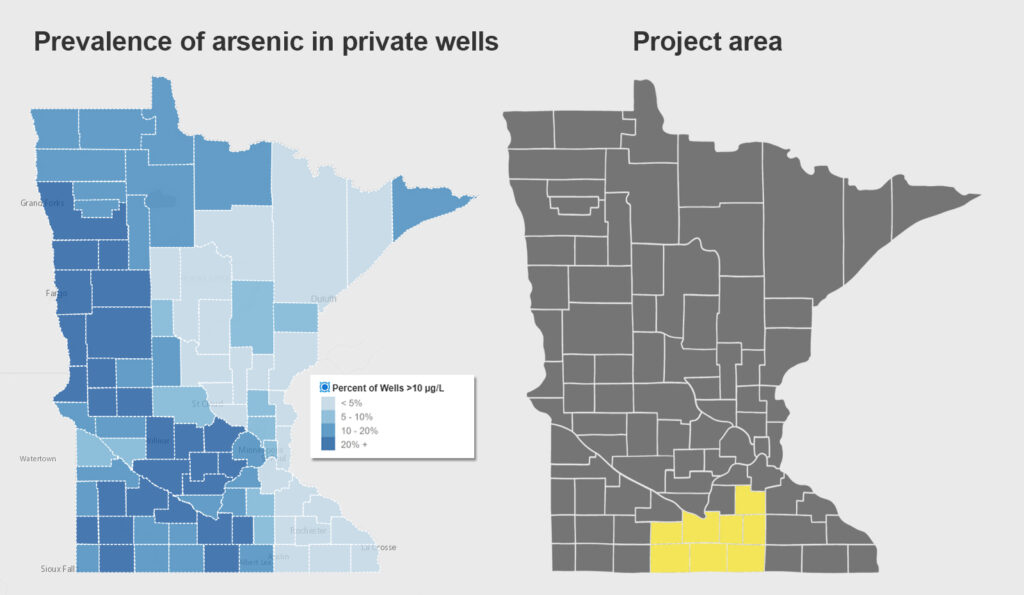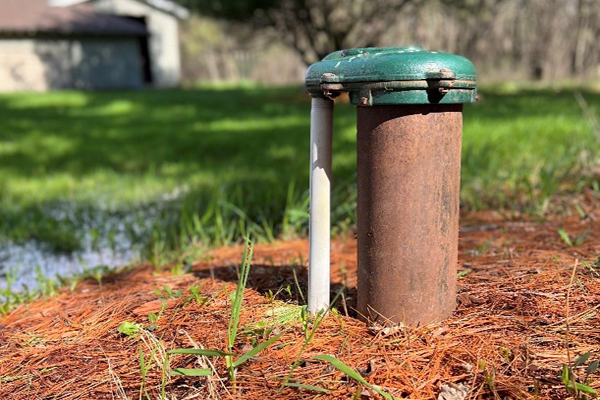Freshwater recently kicked off a new 3-year project in July in partnership with the Minnesota Well Owners Organization (MNWOO), Mayo Clinic, and the U.S. Geological Survey to test 8,000 private drinking water wells for arsenic in southern Minnesota. This pilot project (Rice, Steele, Freeborn, Waseca, Faribault, Blue Earth, Watonwan, and Martin counties) approaches well testing with a new lens by partnering with healthcare physicians to educate and encourage residents to test their wells – and by offering free, convenient well testing opportunities.

Arsenic is an element found in rocks and soil across Minnesota. When dissolved into groundwater, arsenic can impact the safety of drinking water and can increase the risk of cancer and other health concerns such as cardiovascular and respiratory disease, reduced intelligence in children, and skin problems.
Arsenic occurrence in groundwater is difficult to predict before a well is drilled, and concentrations often vary by location. Tasteless and odorless, arsenic cannot be detected unless a water sample is tested by an accredited laboratory. The Environmental Protection Agency has designated 10 parts per billion (ppb) as the standard for arsenic in drinking water, meaning that arsenic levels must be below 10 ppb to be considered safe for drinking. Of the 2,179 new private wells drilled in this 8-county project area since 2008, 16 percent exceed the 10 ppb standard for arsenic, where water treatment is recommended to protect family health. Although there are over 13,500 registered wells in the pilot area, it’s estimated that over 22,500 private wells are actually in use.

While drinking water treated and distributed through municipal systems is frequently monitored for arsenic, drinking water through private wells is the responsibility of the homeowner. Wells constructed in Minnesota after 2008 are required to be tested for arsenic, and results are shared with the well owner and the Minnesota Department of Health (MDH). However, wells constructed in 2007 and earlier may not have been tested to determine arsenic levels. MDH recommends a one-time test of private wells to ensure drinking water safety. Arsenic hotspots exist throughout Minnesota, including the southern part of the state where this project will take place.
A key objective is to educate both private well users and the Mayo Clinic healthcare providers who frequently diagnose and treat preventable diseases linked to chronic arsenic exposure. This will advance drinking water education to protect family health and reduce preventable diseases while establishing a program for arsenic education and testing that can be replicable in other parts of the state.
“Clean drinking water is something everyone deserves,” said Dr. Dominika Jegen, family physician with Mayo Clinic and project partner. “This project helps Minnesota families find out if their well water is safe and gives them simple steps to protect their health. I’m proud to be part of this effort to make testing easier and raise awareness about the risks of arsenic in well water.”
The project team will develop and conduct education programs and multi-media outreach to well owners and family health providers about the geologic occurrence of arsenic and the associated health risks. Throughout the duration of the project, we will also offer online and in-person arsenic testing. Arsenic testing kits will be available online through Simple Lab beginning in September 2025 to those living within the project area. Freshwater, along with MNWOO and the Minnesota Ground Water Association (MGWA) will hold 12 in-person water testing clinics where well owners can receive free nitrate and chloride screening testing in addition to free certified lab tests for arsenic. The clinics starting in November 2025 will also offer free consultation to attendees with groundwater professionals on their well construction and quality of their well water.
Connect with Project Manager Chyann Mosey if you’re interested in hosting a testing clinic in your community. More information on how to request arsenic testing kits will be available in the fall of 2025.
 Funding for this project was provided by the Minnesota Environment and Natural Resources Trust Fund as recommended by the Legislative-Citizen Commission on Minnesota Resources (LCCMR). The Trust Fund is a permanent fund constitutionally established by the citizens of Minnesota to assist in the protection, conservation, preservation, and enhancement of the state’s air, water, land, fish, wildlife, and other natural resources. Currently 40 percent of net Minnesota State Lottery proceeds are dedicated to growing the Trust Fund and ensuring future benefits for Minnesota’s environment and natural resources.
Funding for this project was provided by the Minnesota Environment and Natural Resources Trust Fund as recommended by the Legislative-Citizen Commission on Minnesota Resources (LCCMR). The Trust Fund is a permanent fund constitutionally established by the citizens of Minnesota to assist in the protection, conservation, preservation, and enhancement of the state’s air, water, land, fish, wildlife, and other natural resources. Currently 40 percent of net Minnesota State Lottery proceeds are dedicated to growing the Trust Fund and ensuring future benefits for Minnesota’s environment and natural resources.
It’s inspiring to see communities taking proactive steps to ensure safe drinking water, because protecting health truly begins with what we consume every day.